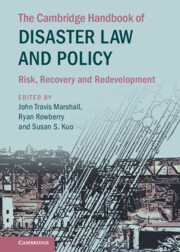Book contents
- The Cambridge Handbook of Disaster Law and Policy
- The Cambridge Handbook of Disaster Law and Policy
- Copyright page
- Dedication
- Contents
- Figures
- Maps
- Tables
- Contributors
- Foreword: Current Trends in Disaster Law and Policy
- Acknowledgments
- Introduction
- Part I Critical Perspectives on the Evolution of Disaster Law and Policy
- Part II Effective Governance as an Imperative for Responsive Disaster Law and Policy
- 3 Governance Structures for Recovery and Resilience
- 4 Governance Strategies for Mitigating Urban Heat Island Effect
- 5 Regulatory Institutional Considerations for Preventing Mining Dam Disasters in Brazil
- 6 Integrating Disaster Risk Reduction and Climate Change Adaptation in the Context of Sustainable Development in Africa
- 7 Climate Resilience in the Greater Bay Area of South China
- 8 An Adaptive Legal Framework for Water Security Concerns in the Guangdong-Hong Kong-Macao Greater Bay Area
- Part III Law’s Role in Promoting Hazard Mitigation: Intergovernmental, International, National, and Local Approaches
- Part IV Private Sector Initiatives to Promote Disaster Resilience and Recovery
- Part V Lawyers As Disaster Law and Policy Leaders: Training for Students and Guidance for Practitioners
- Part VI Cultural Heritage Protection and Cross-Disciplinary Opportunities for Advancing Disaster Law and Policy
- Part VII Disasters and Vulnerable Communities
4 - Governance Strategies for Mitigating Urban Heat Island Effect
from Part II - Effective Governance as an Imperative for Responsive Disaster Law and Policy
Published online by Cambridge University Press: 27 October 2022
- The Cambridge Handbook of Disaster Law and Policy
- The Cambridge Handbook of Disaster Law and Policy
- Copyright page
- Dedication
- Contents
- Figures
- Maps
- Tables
- Contributors
- Foreword: Current Trends in Disaster Law and Policy
- Acknowledgments
- Introduction
- Part I Critical Perspectives on the Evolution of Disaster Law and Policy
- Part II Effective Governance as an Imperative for Responsive Disaster Law and Policy
- 3 Governance Structures for Recovery and Resilience
- 4 Governance Strategies for Mitigating Urban Heat Island Effect
- 5 Regulatory Institutional Considerations for Preventing Mining Dam Disasters in Brazil
- 6 Integrating Disaster Risk Reduction and Climate Change Adaptation in the Context of Sustainable Development in Africa
- 7 Climate Resilience in the Greater Bay Area of South China
- 8 An Adaptive Legal Framework for Water Security Concerns in the Guangdong-Hong Kong-Macao Greater Bay Area
- Part III Law’s Role in Promoting Hazard Mitigation: Intergovernmental, International, National, and Local Approaches
- Part IV Private Sector Initiatives to Promote Disaster Resilience and Recovery
- Part V Lawyers As Disaster Law and Policy Leaders: Training for Students and Guidance for Practitioners
- Part VI Cultural Heritage Protection and Cross-Disciplinary Opportunities for Advancing Disaster Law and Policy
- Part VII Disasters and Vulnerable Communities
Summary
Globally, more and more cities are affected by the Urban Heat Island Effect (UHI). This phenomenon describes urban areas’ increased air and surface temperatures as compared to surrounding suburban or rural areas. The UHI was first observed and analyzed in the early nineteenth century, but only in recent decades has it attracted greater attention from policymakers due to the UHI’s increasing magnitude and widely recognized environmental and health consequences. Increasing awareness among residents about the UHI has further amplified the pressure on city governments to implement mitigation strategies. This chapter explores the strategies and policy ideas emerging in cities around the world aimed at mitigating the UHI. Two major forms of interventions are distinguishable. First, there are measures that specifically and directly target the UHI. Second, there are broader climate change adaptation strategies that involve using tools that indirectly address the UHI problem. Each policy initiative described in this chapter is analyzed with a focus on regulatory strategy – specifically, what are the successful regulatory measures UHI mitigation policy strategies employ? More particularly, what is the correct balance between classical regulation, which relies on imposing obligations and sanctions, and more innovative, flexible, and less directive tools that often encourage autonomous and voluntary citizen engagement in implementing public policy objectives? This chapter will show that what some may consider unorthodox UHI mitigation policies can serve as inspirations for other public intervention strategies targeting climate change.
Keywords
- Type
- Chapter
- Information
- The Cambridge Handbook of Disaster Law and PolicyRisk, Recovery, and Redevelopment, pp. 71 - 80Publisher: Cambridge University PressPrint publication year: 2022



